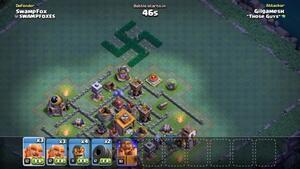The Art of Attack
Video games are inherently sexist. I’ve accepted this fact as true and immutable ever since I began playing multiplayer games. From the way they’re marketed towards boys and the sexist character designs, to the anonymous players’ offensive language, everything about video games seems to scream at me: YOU ARE NOT MEANT TO BE HERE! Perhaps that’s why I’ve avoided playing the most popular kinds of video games. The sort of games you can only play with hand-held controllers or that take up half of your computer’s storage. I’ve never played Halo or World of Warcraft. I’ve never tried entering the worlds of Fortnite or Overwatch. From a very young age, it was obvious to me that strategy and war games were for boys and that I was too genteel to be exposed to that sort of violence. Instead, I originally played games like Cooking Mama and Covet Fashion; the sorts of games that taught me to cook and dress like a good girl should.
Despite their “uncouth” nature, I was drawn to more traditionally male games. When I was in seventh grade I began playing the app Clash of Clans, a simple strategy game in which you build a village and train troops with the goal of winning trophies by attacking other villages. After a certain level, you unlock the ability to join a clan. This allows you to communicate in a private chat with your clan, fight in wars against rival clans, and receive troop donations from your clanmates. The novelty of a game that didn’t score points for boots or sushi rolls astonished and excited me. I’ve continued playing Clash of Clans ever since.
While I really enjoy playing, the rampant sexism in the gaming world is no less present in Clash of Clans than in any other game. Of course, I’ve learned the tricks to avoiding bad situations within the game. While there’s a public chatroom for all players, I know to ignore the offensive conversations that inevitably occur. I also know to never use my real name or reveal any information about myself. And most importantly, I know that I should never, not even to my own clan, admit that I’m a girl. I’ve followed these guidelines for years and for the most part, I’ve been spared from the misogyny and sexism other female players have endured.
Things changed when Clash of Clans came out with an update that involves a whole other village you can build; the village offers new troops, new buildings, and a new way to win trophies. Instead of the regular attacks, this new version allows you to go against another player live, each of you doing as much damage as you can to your opponent’s base within the time limit. Once the attacks are over, the player that has destroyed the highest percent of their opponent’s base wins an allotted number of trophies, while the losing player has trophies taken away. I grew to enjoy playing in these competitions more than the traditional style because it was faster-paced and less certain.
One day I was mindlessly playing the game when I pressed the ATTACK button; as per usual, a small magnifying glass began flying around the screen and the words “Finding opponent” blinked on and off. Then the screen dissolved into my opponent’s base. The first and only thing I saw were decorative green bushes Normally players put them haphazardly around or encircling some other, grander décor. This player’s bushes, however, were neatly placed in the shape of a swastika.
At first I was frozen, unable to fully believe my eyes. Next, I hoped it was meant to be the harmless symbol from Buddhism. But I realized this was wishful thinking. The more I looked at it, the more agitated I got. I wanted to report the player. I wanted to make them get rid of it. I wanted them to explain themselves. I wanted to explain to them how deeply their hate dug into my skin.
I couldn’t do any of that though, because I was speechless. And no, I don’t mean the kind where shock steals the words from your throat. I mean to say that there was no available way within the game to effectively communicate with a live opponent. I could only report someone for what they said in a chat room. The developers probably hadn’t even considered that someone would manage to convey a message through a simple symbol in their village. So, I had no way of expressing my outrage. I couldn’t report the player; I couldn’t force them to change their base; I couldn’t force them to change their mind, either.
I thought of all the misogyny I’d numbed myself to. All the careful precautions I’d used to hide an essential part of my being. I’d always expected to be vulnerable for being a woman, I’d never thought I would be vulnerable for being a Jew. And maybe that’s why it hurt so much more. I knew I was unwelcome by so many people in the gaming world, and here I saw one more player who would probably not only consider me the wrong gender, but also the wrong religion. I felt helpless as the seconds counted down to my attack. This player, whom it would have only taken minutes to arrange the bushes into a hateful image, had struck a harder blow than any Pekka ever could, because they hadn’t hit me, they’d stolen my voice. To me, that base became everything hateful about video games. All the sexism, racism, and anti-Semitism built up into one single symbol. That player became the compilation of all the people who feel I have no right to play.
I realized that I hadn’t escaped all of the hate in video games. My precious rules to protect myself had actually been a way to hold me down. I’d silenced myself for so long, never speaking up against other’s misogyny. I only realized I was silent once the hate was directed at me and I couldn’t yell back. Like the poem First They Came by Martin Niemöller, I hadn’t spoken up and once they came for me there was no one to speak up. Perhaps that’s why I am writing this piece; it’s my first outcry against the hate anonymity has fostered in the video game world. I’m saying video games have allowed far too many of their players to dwell in ignorance and fear. I’m saying it’s their time to step up. I’m saying it’s my time to step up. I’m saying I shouldn’t hide behind my rules, but play with pride as the strong Jewish woman I am.
This piece was written as part of JWA’s Rising Voices Fellowship.








First off I think that you have a talent for writing as this was a well put together opinion piece and makes you think. However I have some issues with some of the articles main points. The main problem I would say is that you call video games inherently sexist and then for evidence use online games alone. The fact that videogames can be sexist is a valid argument however the argument that videogames are inherently sexist is overreaching in my opinion. To say all videogames are inherently sexist is like saying sports are inherently sexist because there are men's leagues. While a lot of online video games may have offensive skins or language in them would that not be a reflection of the player base and not videogames in general. There are many videogames that have not catered to the male audience alone but the ones that have did so as that was their primary consumer demographic till recent. I also think that your missing out on a lot of videogames that would be for all audiences by looking only at online games as the single player genre is a much more suitable genre if you want less offensive games while there is multiplayer fps games like Splatoon that are heavily moderated the main demographic for online games is males as such they cater towards males. Secondly have you not thought that maybe you are playing in to the troll by reacting and writing about it. The troll only has power when you give them it. I am not saying that it was appropriate to put a swastika in the builder base and there should also be moderation to an extent as such symbols are very hurtful and ruin games for people as you have shown. Although I am saying that the vast majority of players don't share anti-Semitic views and the troll may only be trying to be edgy. I also think you may be reaching by calling the swastika that was made a symbol of misogynistic views. I get that those that use swastikas may often share views with sexists but I don't think that the troll was trying to be misogynistic. It also is unlikely that the troll knew that you are Jewish and was just trying to be "funny" in the edgiest way possible. By saying that videogames as a whole are the issue takes away the fact that it is the culture around the main consumer of these online videogames lonely males that don't care who it effects as long as they get a reaction this is not to attack males as a whole either. I just think you could do a lot more by trying to get at the culture around videogames as the videogame industry is not going to be effected by an article but a culture might. I know this is 5 years later but I would love to hear your response. I also hope that your future encounters in videogames are not as bad as this one. : )
Play ace attorney
Llana this is such a great piece! So interesting!
Woop Woop!! Go Ilana!!
Wow! Very interesting topic!